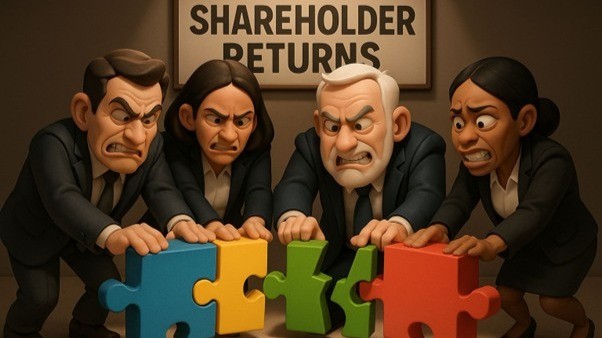The Holding Company Conundrum

On the heels of the Omnicom-IPG merger, still subject to regulatory approval, WPP’s latest announcement- sunsetting and merging brands, centralising teams and tightening control, has been framed as a move toward simplification. But for many of us in the industry, it’s a warning sign: a system straining to sustain itself.
We’ve seen this story unfold before. “Efficiency” is often just code for cuts, and clients ending up with less not more. “Simplification” often means less independence, reduced flexibility, and a diminishing space for fresh thinking.
At its core, the holding company model is designed to maximise scale and shareholder returns. However, modern marketing is calling for something very different: transparency, accountability for business outcomes, agility, senior attention, talent quality & continuity, independence and objectivity. There’s a growing disconnect between what clients need and what the legacy structures are built to provide.
These holding company moves signal not evolution, but contraction: a model doubling down on centralisation in the face of growing complexity and client demand for flexibility.
When clients leave, it’s not just about price.
When marketers walk away from holding companies, it’s not always to cut costs, but to be heard. To work with partners who are responsive, who bring experience to the table, who move fast, and who aren’t hamstrung by internal politics, quarterly reporting cycles and delivering shareholder value.
Consolidation comes at a cost
As holding companies collapse agencies into each other, the lines between accounts blur. Conflicts emerge. Client choices are removed. Long-term partnerships are jeopardised, not due to underperformance, but because the system itself can no longer support them.
And the human cost is high
These restructures are leading to job losses across the industry. Talented, passionate people, none of whom caused the structural failings, are being displaced. Their livelihoods are upended. The colleagues left behind are expected to absorb the workload, spread thinner, asked to deliver more with fewer resources, often with less autonomy.
And clients feel the impact. When experience walks out of the door, service suffers. Relationships weaken. Continuity disappears. This isn’t just about headcount, it’s about the erosion of trust and the diminishing ability to deliver the quality, consistency, and partnership that clients deserve.
There is an alternative way
At Local Planet, we’ve built a global network of owner-led, locally embedded agencies. This independence gives us the freedom to think and act in our clients’ best interests, not someone else’s bottom line.
Our clients don’t get handed off or homogenised. They work with senior teams who stay close to the business, and collaborate across borders without red tape or rigid hierarchies.
Independence isn’t just a structure, it’s a belief system.
A return to first principles
Trust. Craft. Accountability. These values haven’t disappeared, they’ve just been moving outside the traditional model, to places where they can thrive.
What’s happening in the holding companies is symptomatic of a broader shift. Innovative thinking and enduring partnerships are being found by marketers outside the holding company ecosystem. Not because it’s fashionable, but because it delivers better client outcomes.
Flexible tech, smarter data
Holding companies are often locked into centralised platforms and rigid systems, optimised for internal margin, not client value.
Independent agencies have the freedom to adopt best in class tools and deploy more flexible technology and data solutions, tailored to what clients actually need. It’s not about owning the stack, it’s about using the right one, for better client outcomes, faster.
AI changes the equation
And now, AI is flattening the field, shifting the advantage from size to speed. With powerful tools now widely accessible, independent agencies can deliver smarter strategy, faster execution and deeper client focus, without the drag of internal politics or platform constraints. You don’t need to be a holding company to be smart, AI doesn’t reward centralisation or size. It rewards clarity, flexibility, and sharp thinking. The future isn’t about consolidation. It’s about liberation, powered by AI and led by agencies that are free to put clients first.
Independence frees agencies from bias and holding company pressures, allowing them to act solely in the best interests of their clients.
The future for agencies shouldn’t rely on consolidation but on putting clients first.
Martyn Rattle
CEO, Local Planet